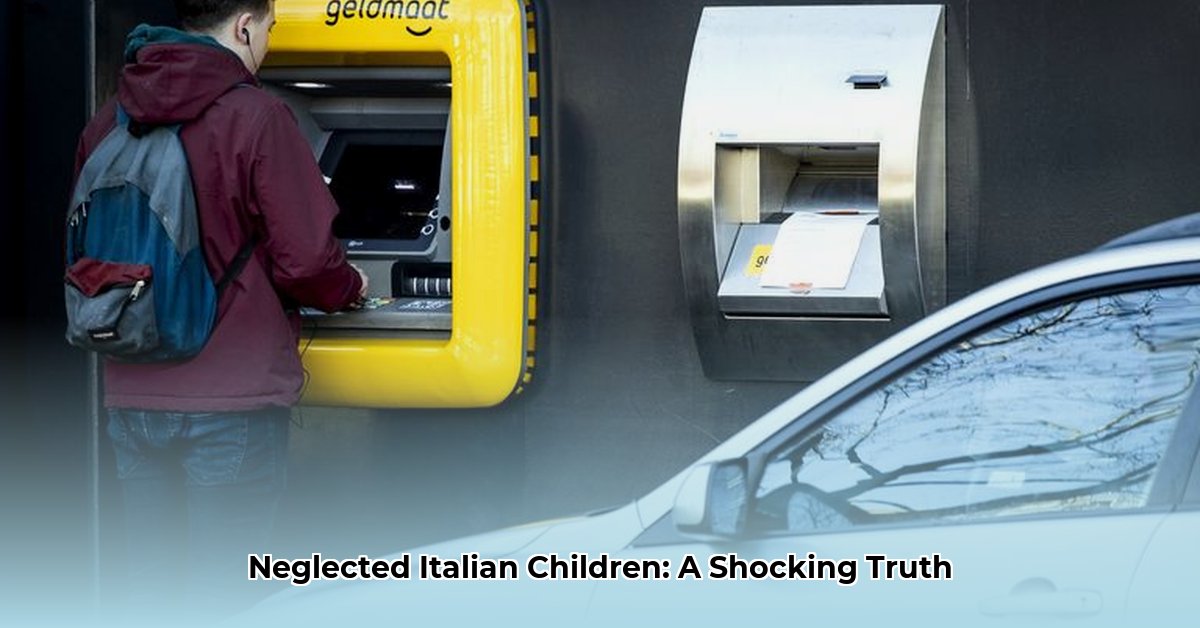
Verwaarloosde Kinderen Italie: A Shadow of Fear
This heartbreaking story involves two young Dutch siblings, aged six and nine, discovered living in appalling conditions on an isolated Italian farm. Their father, consumed by an extreme fear of germs exacerbated by the COVID-19 pandemic, kept them sequestered, resulting in severe neglect. This isn't just a single case; it highlights systemic failures and underscores the devastating impact of untreated mental health issues on vulnerable children. How could this happen, and what can we learn from this tragedy?
A Childhood Stolen: The Brutal Reality
These children were deprived of a normal life – sunshine, laughter, social interaction, and even basic necessities like adequate nutrition and hygiene. Their development was significantly impacted. Their isolation and neglect caused profound developmental delays that are shockingly inconsistent with the father's claims of providing adequate care and education. Experts found deep-seated developmental setbacks in both children, directly contradicting the father's narrative of alternative home schooling.
The scale of the neglect was profound, evident in their physical condition and developmental delays. Medical professionals documented severe deficiencies in their development, illustrating the long-term effects of such deprivation. Isn't it chilling to consider the irreversible harm inflicted on these innocent children?
Dad's Claims: A Clash With Reality
The father attempted to justify his actions, claiming to have provided appropriate home schooling and care. However, this assertion starkly clashes with the children's severely compromised physical and developmental state. The stark contrast between the father's words and the children's reality speaks volumes about the gravity of the situation. How could such a significant gap between stated actions and actual conditions have gone unnoticed for so long?
The Mother's Role: An Ongoing Investigation
The mother’s involvement remains unclear and is currently under investigation. Determining the extent of her complicity, or her inability to intervene, is crucial to fully understanding the circumstances that led to this devastating outcome. The investigation aims to clarify her role and level of awareness in the children's plight.
Systemic Failures: A Cross-Border Breakdown
This case exposes significant failings in both the Dutch and Italian child protection systems. The lack of official registration of the children in Italy hindered early detection and intervention. This highlights a critical need for improved cross-border cooperation and information sharing to protect vulnerable children. Why did the systems fail to protect these children? What changes are needed to prevent similar tragedies?
Healing and Prevention: A Multi-pronged Approach
Rehabilitating these children requires a comprehensive and sustained effort.
Immediate Intervention: The children require intensive therapies, including speech therapy, remedial education, and trauma-focused psychological support to address their developmental delays and emotional scars.
Thorough Investigation: A full investigation is crucial to hold those responsible accountable and identify systemic vulnerabilities within the child protection systems across both countries.
Long-Term Support: Ongoing support, including educational programs and continued therapeutic interventions, is vital for the children's long-term well-being and integration into society.
Systemic Reform: Improvements in cross-border communication protocols and information sharing between Dutch and Italian authorities are indispensable. This includes enhancing existing child protection legislation and improving inter-agency coordination.
Mental Health Support: The father requires immediate and ongoing mental health support and treatment to address the underlying anxieties and fears that led to their seclusion.
What Lies Ahead: Assessing the Risks and Mitigation Strategies
The children face significant risks, demanding comprehensive and ongoing intervention. This must include addressing their developmental delays, psychological trauma, and the possibility of parental recidivism. Effective mitigation strategies must be developed and implemented to minimise these risks.
| Risk Factor | Likelihood | Impact | Mitigation Strategies |
|---|---|---|---|
| Long-term developmental delays | Very High | Very High | Intensive, ongoing therapy; specialist educational support |
| Psychological trauma | Very High | Very High | Trauma-focused therapy; safe and nurturing environment |
| Parental recidivism | Medium | Medium | Close monitoring; mandatory mental health treatment compliance, and family therapy. |
| Systemic failures in protection | Medium | Very High | Improved inter-agency communication; better cross-border information sharing; improved child protection legislation |
Preventing Future Tragedies: A Call to Action
This case serves as a stark reminder of the devastating consequences of untreated mental illness and inadequate cross-border cooperation in child protection. The need for improved access to mental healthcare, strengthened community support networks, and enhanced collaboration between authorities is undeniable. We must learn from this tragedy and implement proactive measures to safeguard vulnerable children. The future of these children, and countless others, depends on our collective commitment to preventing similar tragedies.